

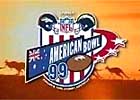
Click '99 logo for some
photos of the big day



|

|

The origins of the most storied franchise in the history of the NFL, the Green Bay Packers,
date back in many respects to 1895 when the Green Bay Town team, an aggregation
of local atheletes, played other Town Teams from communities surrounding Green Bay. In the stretch of time between 1890 - 1950 hundreds of Town Teams or 'elevens" as they were known, came and went across the Midwest but as noted in the excellent book "Before they were Packers" in the absolute sense of the term the last remaining Town Team is the Green Bay Packers.
It was an inglorious beginning with a mere three victories in the first two years of competition. During each game, the team manager passed the hat among the spectators, asking for donations for the players, and after the game, the two teams divied up the take. Thus, these teams were among the first "professional" football teams in the United States.

|
While these origins of the Green
Bay Packers are particularly interesting for those fans who have a keen sense of history, it's generally regarded that the great saga
of this club began in August 1919, when the Indian Packing Company agreed
to sponsor a local pro football team under the direction of Earl (Curly) Lambeau. |
As noted by Larry D Names "The truth
of all this is the Green Bay Packers are legendary, and like all legends,
their beginnings must be clouded in mystery and intrigue. If they weren't,
the Packers would be the Tampa Bay Buccaneers."
The players held their first practice
on Sept. 3, 1919 and played their first game on Sept. 14, against the Menominee
North End A.C. Green Bay won that game, 53-0. Green Bay's one-sided victory
over Menominee in its first game was the first of 10 consecutive triumphs
in a season that saw Green Bay out score its opponents 565-6. Green Bay's
only loss in that first season came in its last game, on Nov. 23, at the hands
of a team that curiously called itself the Beloit "Fairies". The Green Bay
Gazette reported the next day "Capt. Lambeau's team was robbed of victory
by Referee Zabel of Beloit." Apparently, Lambeau scored three touchdowns
that were called back on illegal motion penalties by Mr. Zabel. (It's the
stuff of legends isn't it?)
In 1921, the "Packers" as they had become
known, were granted a membership in the newly formed National Football League.
Today the Packers rank as the third oldest team in pro football.
Until more recent years, the long and
much celebrated history of the Green Bay team was one of struggle, for both
financial survival off the field and playing stability on the field. As a
consequence the Packers' record has been punctuated with periods of both
the highest success (The "GLORY Years") and the deepest depths of defeat (The "GORY Years"). [Click here for a small but nice photo gallery of these early years.]
While many great football players have
taken the field for Green Bay over the years including 17 Hall of Famers -
two coaches, Lambeau and Vince Lombardi, stand out in particular as the most dominant
figures in Packers' history.
Between the two of them, Lambeau
and Lombardi brought the Packers 11 NFL championships and two record strings
of three straight titles, including the first in 1929, 1930 and 1931. Their
combined record stands at an inspiring 310-136-25. |

Bart Starr in action
|
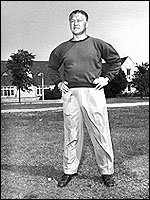
Curly at Rockwood Lodge
|
During the late 1930s and early
1940s, the Lambeau-led Packers were annual championship contenders. They
won four divisional crowns and NFL titles in 1936, 1939 and 1944. |
|
With the departure of Lambeau the Packers
struggled. From 1950-58 the Packers went 32-72-2 under three different coaches.
The team had become pro football's provincial joke. In 1958 in his only year coaching the Packers,
"the nicest guy who ever coached", Raymond "Scooter" McLean had established
a new standard of ineptitude, compiling the worst record in team history,
1-10-1, a mark that New York sportswriter Red Smith, who had grown up in Green
Bay, later immortalized with the phrase: "The Packers underwhelmed ten opponents,
overwhelmed one, and whelmed one."
|
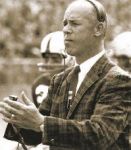
|
Quarterbacks Babe Parilli and Bart Starr threw 13 and 12 interceptions, respectively, and totaled just 13 touchdowns. Paul Hornung was the leading rusher with 310 yards in 69 attempts, while talented rookie Jim Taylor had 247 yards in 52 attempts for a 4.8-yard average.
By the end of 1958 Commissioner Bert Bell was being
pressured by big-city owners to fix the Packers or bounce them from the league.
The long-running love affair between the people of Green Bay and its football
team had also soured. The miracle that such a small town (population 62,888)
could sustain a professional club was not enough:- it had to win championships,
as it had in the twenties, thirties and forties.
"It was a pivotal year in Packers' history," said Lee Remmel, former team historian and director of public relations. "It was a very disappointing season with the fewest victories, but it also triggered the best of times to come.
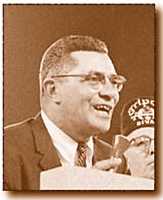
Vince Lombardi
|
As fate would have it the answer
presented itself in 1959 with the appointment of Lombardi. The ensuing Packers' dynasty years of
the 1960s under Lombardi's direction, began with Green Bay winning NFL championships
in 1961 and 1962. It finally ended after their second string of three straight
titles in 1965, 1966 and 1967. |
| After another bleak period in the
1970s & 80s the Pack commenced another resurgence in the 1990s this time
under the direction of General Manager Ron Wolf and coach Mike Holmgren. With
the key signing of Defensive
End Reggie White and the blossoming of back up QB Brett Favre, the Packers
became once again regular Play-off contenders and Divisional Champions. |
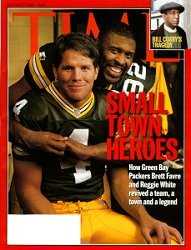
|
In 1996, the Packers returned to the top of the pro football world when they won Super Bowl XXXI while in 1997 they came breathtakingly close to securing an opportunity to win back-to-back Super Bowls for a second time. Sweeping to a second consecutive 13-3 mark and a third consecutive Division title, hopes of a repeat were high when scores were 24-24, early in the fourth quarter. However a Broncos late score with only 1:45 remaining sealed their 31-24 win.
|
A third straight Super Bowl trip, a realistic goal at the outset, eluded the Packers in 1998, their 80th season. Despite advancing to the playoffs for the sixth year in a row, a team record, and posting a seventh consecutive winning season the end of the 1998 season saw Mike Holmgren pack his bags and head to Seattle where he could finally take on a role as General Manager and Head Coach. Many other personal and position coaches followed Mike creating some big holes in the organisation.
On the up-side Coach Holmgren had revived a franchise stuck in neutral. In the period between Lombardi and Holmgren the Packers won only 40% of their matches. For the next 20 years however after Holmgren's arrival in 1992 the Packers went on to win 63% of their games. |
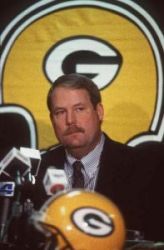 |

|
Following Holmgren's departure Ray Rhodes, offensive coach with
the Philadelphia Eagles was appointed as the Packers 12th Head Coach. However
after a somewhat disappointing 8-8 season when the Packers failed to make
the playoffs for the first time since 1992 Ron Wolf acted quickly and sacked
Rhodes. Go to story |
Rhodes had joined "Scooter" Mclean with the distinction
of only one coaching season with the Pack.
"I relieved Ray Rhodes as head football
coach of the Green Bay Packers," announced Executive Vice President/General
Manager Ron Wolf at a packed news conference at Packers headquarters on Monday
morning, 3 Jan 2000. "For whatever reason, our players did not respond
to this program," said Wolf. "We will begin our search for a new coach at
once."
| Two weeks later Mike Sherman, offensive
coach with Seattle Seahawks was introduced as Head Coach Number 13. Like Coach
Rhodes, Sherman was also a former Packer's assistant coach (having left the
Packers in 1998 with the Holmgren 'mass' exodus). This appointment also came
at a time when the Packers organisation was faced with the challenge of seeking
public funding of a renovated and expanded stadium. Go to story |

|
2000 turned out to be a year of positives. Under new coach
Sherman the Pack finished a gallant 9 and 7 despite injury woes and the renovations
of Lambeau field had been secured with a successful vote of confidence from the
county. Then another bomshell hit at the end of the season.
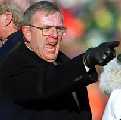
|
It was generally considered that as long as the Green
Bay Packers had Ron Wolf running their football operation, they had an advantage
over almost every other franchise in the National Football League. Well that
critical edge was lost in February 2001 when the 62-year-old Wolf stunned
the football world by announcing his retirement to take affect at the end
of the 2001 draft. |
|
Packers president Bob Harlan responded by handing Wolf's
duties as general manager to head coach Mike Sherman. The move, which Harlan
conceded wasn't without risk, returned the organization to the omnipotent-coach
structure that flourished under Vince Lombardi from 1959-'67 and failed under
Phil Bengtson, Dan Devine, Bart Starr and Forrest Gregg from 1968-'86.
In Ron Wolf's tenure as general manager, the Green Bay
Packers had a 101-57 (.639) overall record. Some of the team's accomplishments
in his nine seasons included:
• Back-to-back Super Bowl appearances (1996
and '97), and the franchise's first Super Bowl championship in 29 years (1996);
• Three consecutive NFC Central Division championships
(1995-'97);
• The first string of four double-digit winning
regular seasons for a Green Bay team since 1929-'32 (11-5 in 1995, 13-3 in
both 1996 and '97, and 11-5 in 1998);
• The first 16-victory season in the Packers'
82-year history (1996); and
• The second-longest home-field winning streak
in NFL history (25 straight regular-season games)
|
 |
The Packers reworked the final three years on Wolf's contract
to reflect the consulting role he took on. In the mean time Sherman in
his first three seasons did not disappoint fans by winning more games (33)
than any of his predecessors, including team founder Lambeau and the fabled
Lombardi recorded in their first three years.
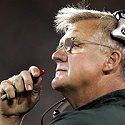
| To season's end 2004, Sherman's regular-season record of 53-27 ranked third among the 32 active coaches in winning percentage at .663. Sherman's Packers also won three straight NFC North Division titles and made the playoffs four straight years. Unfortunately a lack of playoff success soured an otherwise excellent record. |
In January 2005 Packers President Bob Harlan named Ted Thompson as executive vice president, general manager and director of football operations. In hiring Thompson, Harlan made it clear that his new general manager had full authority over the football operation, including the right to fire the head coach. In fact, Harlan used the same written agreement the club had used to sign Wolf 13 years ago for the basis of Thompson's contract. In August 2005 a two-year contract extension with Sherman as executive vice prersident and head coach was also agreed to.
While Season 2005 held plenty of promise, the serious run of injuries to a number of central players such as Ahman Green coupled with the loss to free agency of key guards Marco Riveria and Mike Wahle saw the year turn into serious disappointmnet with the Packers finishing with a 4-12 record, their first losing season in the Brett Favre era and their worst season since a 4-12 mark in 1991. It also spelt the end for Mike Sherman despite his 59-43 career record which ranked fourth in team history in both victories and winning percentage (.578) and whose three division titles rank tied with Mike Holmgren for third in franchise history.
| Despite only taking 78 Games to reach 50 victories [second-fastest behind Vince Lombardi (66)] Sherman's draft and free-agent signings had been fraught with mistakes. His 2-4 record in the playoffs and 13-14 record at Lambeau Field from the playoff loss to Atlanta on Jan. 4, 2002, until the end of 2005 season were further compounded by Season 2005. In his sixth season Sherman's Packers shelf life had effectively expired. Just as new general manager Ron Wolf fired Lindy Infante after the '91 campaign so Wolf could hand-pick his head coach, Thompson chose to dismiss Sherman so he, too, could hire his own man. |

Ted Thompson: "I felt like we needed to go in a different direction."
|
 |
On 12 January 2006 Mike McCarthy was named the Packer's 14th Head Coach. At 42 McCarthy, became the league's youngest head coach and he finished his first season, 8-8. However unlike Rhodes and "Scooter" Mclean McCarthy McCarthy would go on to face further seasons as Packer's Head Coach. |
|
The 2007 season's 13-3 record matched for the third time the Packers' mark for most regular-season victories since the NFL went to a 16-game schedule in 1978. The other two were in 1996 and 1997, and both those years ended with them playing in the Super Bowl. Unfortunatly, however it wasn't to be this time around, with the Packers coming within an overtime defeat of advancing to the Super Bowl.
|
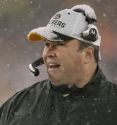 |
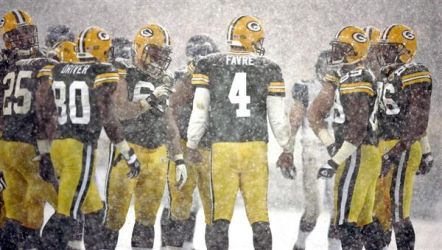 |
By March 2008 the initially sad news that Favre wouldn't be quarterbacking Green Bay for the first time since September of 1992, came as not only as a surprise to many but also ultimately as an almost ineviatble outcome to a season that ended with the overtime loss to the New York Giants in the NFC Championship. After giving so much to the team in a near MVP season and with nearly all of the meaningful QB records under his belt, Brett had apparantly finally made a decison to go out on his own terms while still on top of his game. After 16 seasons in a Packers uniform (1992-2007), Frave had also matched Bart Starr (1956-71) for the longest tenure in team history among his 30 team records.
No one could have known however that Favre's teary and heartfelt retirement news conference was actually to be a warm-up act for what turned out to be five-month soap opera.
 |
By the time he decided he kind of maybe definitely wanted to return, the organization had moved on without him, deciding to place the team's immediate future in in hands of Aaron Rodgers. |
On 3 August 2008 after a series of bizarre twists and turns, Farve was reinstated to the roster and by 6 August it was announced that an agreement had been reached to trade the future Hall of Famer to the New York Jets. This saw Favre leaving Green Bay as the NFL's all-time leader in most major passing categories, his 253-game starting streak intact.
Despite early victories, 2008 actually turned out to be one of the most exasperating seasons in franchise history. How else to explain scoring 419 points (seventh best in team history) while finishing with a 6-10 record? According to Eric Goska, of the more than 750 NFL teams with losing records since 1920, only five have scored 400 or more points! The Packers managed to lose seven times when they were either ahead or tied with less than 4 minutes left in regulation. They also set a team record with 7 games lost by four points or fewer in a season. Packers' fans everywhere endured a most peculiar season of highs and lows, just the second losing season in Green Bay since 1991.
Farve's trade to the Jets however was not the issue. Rodgers' play in his first season as starter saw him ranked fourth in the league with 28 touchdown passes and 4,038 passing yards and sixth with a 93.8% passer rating (Farve finished 9th - 22TD's, 11th - 3,472yds & 21st - 81%). Rogers in fact outranked Favre in all categories except for completion percentage, while his 13 interceptions were 9 fewer than Favre's league-high 22.
Having said that Rodgers isn't Favre and the curious circumstances of Farve's departure unfortunately left a million unanswerable "what if" questions in their wake. Importantly however for Packer fans (as opposed to Farve fans) Rodgers started all 16 games and become one of the NFL's most prolific first-year passers, providing plenty of positive signs that there could be brighter days ahead.
The last game of the season against the Lions also provided a happy note to an otherwise tough season with the Packers becoming the first time in league history to have a pair of 100-yard rushers (Grant and Wynn) and 100-yard receivers (Jennings and Driver) in a single game....... in the mean time for the second time in less than a year, quarterback Brett Favre announced his retirement and once again unsuccessfully retired by signing with the Minnesota Vikings......
|
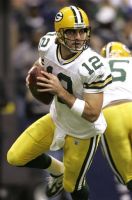
|
So onto season 2009 with the youngest team in the NFL, Green Bay finished strongly earning a NFC wild-card playoff bid with an 11�5 regular-season record. The Packers defense was ranked #2 and the offense was ranked #6 and Rodgers also becoming the first quarterback in NFL history to throw for at least 4000 yards in each of his first two seasons as a starter.
Season 2010 saw the Packers enter a new era. When the season started, the Packers had the fifth youngest roster in the NFL (25.92 years) and were a popular pick to win it all. Then Grant went down in the first half of the opener, the first of a wave of injuries that would have brought a weaker team with a lesser roster to its knees. Against all odds however the team finished the regular season with a 10-6 record and clinched the #6 seed in the NFC playoffs.
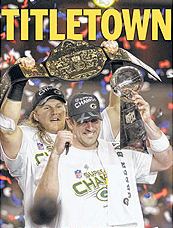
| Sweeping through the playoffs (including beating the Chicago Bears 21-14 at Soldier Field) the Packers headed off to Super Bowl XLV. A proud Steelers team that was trying to win its 3rd title in 6 years was defeated and as a consequence the Pack became the first #6 seed in the NFC to win a Super Bowl. It was the 13th NFL title for the storied franchise and its first championship in 14 years. To cap things off Aaron Rodgers was also named Super Bowl MVP, something that Brett Farve never achieved.
|
In four playoff games Rodgers had also thrown for 1,094 yards and nine touchdowns to join Kurt Warner (2008) as the only quarterbacks in NFL history to throw for 1,000 yards and nine touchdowns in one postseason.
Season 2011 brought with it a veritable plethora of NFL and franchise records and ultimately finished with a rotten home playoff defeat. It was a season of offensive highs and defensive lows. Rodgers threw a team-record 45 touchdown passes and broke the NFL record for passer rating (122.5). Green Bay also swept all division games for the first time in team history since the NFL went to the current divisional format in 1967, and became the first team to sweep the NFC North/Central since the 1987 Chicago Bears. On the flip side, the defense ranked last in the league in yards allowed and passing yards allowed. Those numbers equated to one of the worst defenses in NFL history. After finishing the regular season a franchise record 15-1 and after riding the second-longest winning streak in NFL history (19-games) the Packers sadly went home empty-handed. One bad game against the Giants and incredibly it was all over for 2011.
If the great Lombardi was still alive today, he might not recognize much about the game his teams dominated in the 1960's and regained glory in the 1990's and 2000's by winning the trophy named after him. He certainly could be bamboozled about the constant chatter of Facebook and Twitter and the ubiquitous mobile phone and internet all around us. He would, however, clearly recognize greatness, a constant regardless of era. In this regard the future remains extremely positive for the Packers.
Since 2006, McCarthy has won 65.6% of his games, gone 5-3 in the postseason, led the team to two NFC Championship Games and won a Super Bowl.
Much credit should also go to the Packer's GM Ted Thompson who made some pretty tough decisions including letting Brett Farve, the face of the franchise, go three years earlier. This in part explains why the Packers� future looks so bright. Football decisions are being made by someone who places great value in draft choices and isn't concerned about popularity. Thompson sticks by his convictions and today in many respects could be considered the architect of the Packers� Super Bowl XLV title.
The team has also now clearly moved on to the Aaron Rodgers era. In his first four years as a starter Aaron has achieved great things. Not only was he named a Super Bowl MVP (2010) and league MVP (2011), but he has thrown an NFL record 17,366 yards and 132 touchdown. He also has the No. 1 career passer rating in NFL history. So what will Season 2012 bring, time will only tell. .......
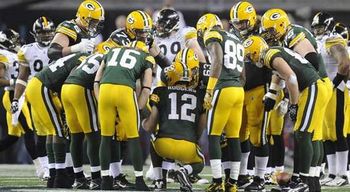
Stay tuned good reader.


|

|
|